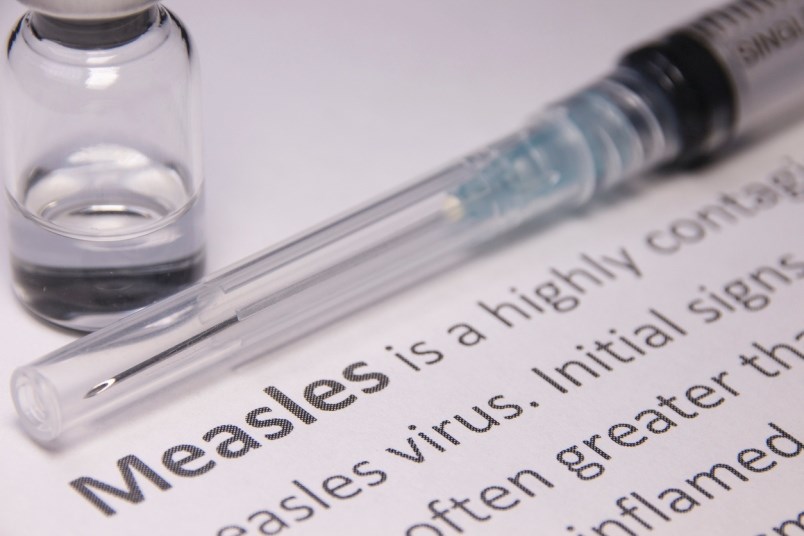There are two more reported cases of the measles in Vancouver.
Vancouver Coastal Health confirmed Friday afternoon that there are now 10 reported cases of the measles that. This time medical health officer Dr. Althea Hayden said officials are warning about possible exposures to the virus at locations in Vancouver as well as Richmond, Squamish, Whistler and Steveston.
Hayden said that one of the cases is definitely linked to the outbreak at three local French-language schools — elementary schools École Anne-Hébert and École Rose-Des-Vents, and high school École Jules-Verne. However officials have not been able to determine the source of the second infection, which increases the chances of further unidentified exposure in the community.
The health authority released a list of public venues where people could have been exposed to the virus on specific days and times.
The list includes:
- Feb. 15 – Russel Sean Fitness in Richmond between 5:30 a.m. and 9:30 a.m.
- Feb. 15 – Canada Line southbound between the Broadway-City Hall and Langara-49th Avenue stations between 9 a.m. and 11:30 a.m.
- Feb. 15 – Langara College Tech Building between 9 a.m. and 4:30 p.m.
- Feb. 15 – Sport Chek in Richmond Centre between 3 p.m. and 5:50 p.m.
- Feb. 17 – Starbucks on No. 1 Road and Bayview in Richmond between 12:30 p.m. and 2:30 p.m.
- Feb. 17 – Dave’s Fish and Chips in Steveston between 1 p.m. and 3:45 p.m.
- Feb. 18 – McDonald’s in Squamish between 9:45 a.m. and 11:45 a.m.
- Feb. 18 – Scandinave Spa in Whistler between 11 a.m. and 7:15 p.m.
Hayden said that it is safe to visit any of those locations now, and that the risk of exposure was only during those specific days and times.
The first case was reported on Feb. 9. In that case, the infected person picked up the virus while traveling outside North America and, Hayden said, none of the other cases reported have been linked to that infection. The following week eight cases were reported and linked to three local French-language schools — elementary schools École Anna-Hébert and École Rose-Des-Vents, and high school École Jules-Verne. Thirty-five students and one staff member from two of the schools, Rose-Des-Vents and Jules-Verne, who could not prove immunity to the virus, or who had not previously received the vaccination, were ordered to stay home until the risk of infection has passed.
The measles virus is highly infectious and can spread through the air when an infected person coughs or sneezes and you do not have to be in close contact with an infected individual to catch the virus.
The virus can survive in a closed area, like a bathroom, for up to two hours after an infected person was there. It can also be spread through sharing food, drinks or cigarettes, and kissing. Someone infected with measles is contagious for four days before they even start showing symptoms and for four days after the onset of the rash.
It can take as few as eight and as many as 21 days to develop symptoms after being exposed to the measles virus.
Symptoms include: fever, red eyes, which may be sensitive to light, cough, a runny nose and rash.
Complications from the virus include pneumonia, inflammation of the brain (encephalitis), seizures, deafness, brain damage and death.
The measles vaccine is 99 per cent effective in preventing the virus when two doses have been administered. Children born in B.C. in or after 1994 routinely get two doses of the MMR vaccine — one at 12 months old and a second dose before starting kindergarten.
Vancouver Coastal Health warns that anyone born after 1970 and before 1994, or grew up outside of B.C., may have received only one dose of the vaccine.
The vaccine is available free of charge at public health units or the City Centre Urgent Primary Care Centre (1290 Hornby St.).
Hayden said that getting the measles vaccine within three days of exposure can provide some protection. As well, for those who are at a high risk of developing a more severe infection, pregnant women, those with a compromised immune system or children under one year of age, Hayden said a medication called immune globulin can reduce the risk of severe illness if given within six days of exposure.
@JessicaEKerr
jkerr@vancourier.com



